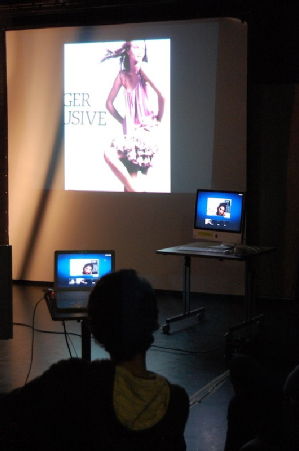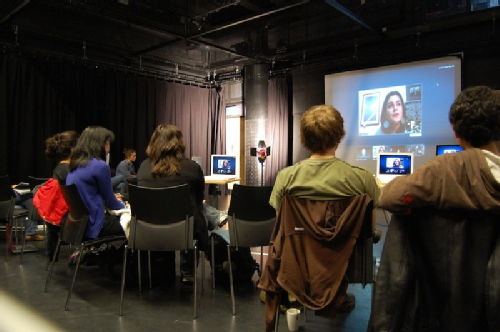Telepresent Tehran
Originally posted to the OSL Observatory blog on 13th February 2011. This activity was part of the OSL ethnodrama strand.
I’ve seen some truly great teaching in the last week! In my role as E-learning Advisor and National Teaching Fellow I get to see great teaching at Warwick every week. But the Open-space Learning session that I helped with this week was particularly special. It reminded me of my time as a philosophy undergraduate here (1991-1994): three hours of inspiring, challenging, intellectual and emotional intensity, which I’m sure for some of the students will be a life-changing experience. It reminded me of how great teaching starts with inspirational experiences of this kind (the first of the two key aspects of a great HE student experience). And it made me question how well we are catering for the other key aspect of great HE.
The session was designed and run by Annouchka Bayley (a Theatre Studies graduate research student). It was part of an interdisciplinary series investigating the role and practice of verbatim theatre. Sixteen students attended (voluntarily), with the CAPITAL Studio (large black OSL space) set up for video conferencing. Following a short introduction from Annouchka, we watched a film created by the Iranian journalist and film maker Haleh Anvari. This was followed by one of the best philosophical and cultural discussions I have heard – largely student led. I was in fact astounded by the intellectual quality and power of the dialogue. It reminded me of the many great events out of which my own Warwick degree was built.
In this instance, however, we could go even further, making it even more powerful and significant – especially considering the events taking place in Cairo. Our experience within the safe confines of the theatre studio was intensified and made more real by the live presence of Haleh herself, via a video conference link from Tehran (using Warwick’s excellent Cisco WebEx system). As we watched the film on the big screen, Haleh was with us. Each small group of students could see her responses live on a MacBook right in front of them. In return, Haleh could see the students respond.
And then the discussion: not just theoretical, but with a real live Iranian woman, academic, journalist, activist to answer our questions, to break or confirm our theories. Here the Open-space Learning inspired set-up of the space proved to be ideal. Using a theatre space, with a large empty area in the centre, invited the students to stand up, walk forwards (towards Haleh on the big screen and the video camera on the iMac) and ask a question. Thus introducing a physicality to the dialogue. It would, under different circumstances, be an ideal space in which the students could also perform in some theatrical way.
Here’s what one of the students said in reflection on the event:
“I’ve never done this before. It was mind-blowing. I cried throughout most of the film, because of the subject matter, but also the presence of the author, the real woman, in Iran. She was here, hearing us and seeing us, talking about her experience and our link, our now personal link. And because we were together, it was so moving, so much real, in a way in which we would never normally experience in teaching.” (Sita Thomas, 3rd Year English and Theatre)
And a few words recorded at the end...
That’s what constitutes great teaching. An outstanding immersion in theory and practice, demanding and making space for the students to respond with their own experiences and theories to connect with the personal and the global, with the present and the great vistas and dynamisms of culture and history. Looking back upon my own experience of such teaching, I now know that they have a lasting and deep impact. Not just immediately, but for many years beyond graduation.
Or at least that’s half the story.
As I said earlier, there are two vital aspects to great HE: a) inspirational events; b) complemented by supporting frameworks, technologies, spaces and institutions that allow the student to sustain and grow what they have taken from the event, to make something of their own from it. Traditionally (in non-scientific disciplines) they build essays. Increasingly, undergraduates undertake more substantive research projects. Almost as an aside, they may engage in organised cultural or political activities (for example through the Students’ Union). Rarely do we see them create anything that goes beyond the temporal and spatial bounds of their degree (for example, establishing an intellectual, cultural, social or economic enterprise). I argue that Warwick must go further in this second aspect, to match the outstanding events that occur. Annouchka’s project will see the students creating their own verbatim theatre and films. We must support a greater diversity in student “enterprise” (meant in the broad sense of creating and sustaining an intellectually, culturally or economically profitable activity). At the Institute for Advanced Learning and Teaching we provide learning spaces and an open-access Media Suite (with everything that the students need to make films). That will help with the necessary diversification. But we need to go further, we need to support students in going well beyond the academic degree, in taking what they experience at Warwick and creating new enterprises linked to Warwick once that they have graduated. The Knowledge Centre is one important initiative that has been taken – keeping the flow of inspirational experiences and support going for all of our alumni.
So, to conclude, great teaching is: inspirational experiences + great student support + student enterprise. We certainly have the former, and are extending and improving them all of the time. But we need to ensure that we don’t lose sight of the latter, and that we keep pushing on so as to establish Warwick as a hub for social, cultural and economic enterprises.
You can read more about my ideas at: http://www.inspireslearning.com/portfolio
And more about IATL at: http://go.warwick.ac.uk/iatl


